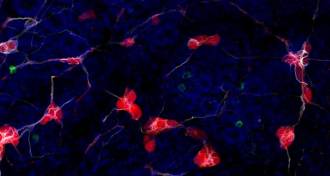Uncategorized
-
 Health & Medicine
Health & MedicineHeartburn drugs may raise stroke risk
Drugs used by millions for heartburn linked to increased risk of stroke.
By Laura Beil -
 Neuroscience
NeuroscienceDespite Alzheimer’s plaques, some seniors remain mentally sharp
Plaques and tangles riddle the brains of some very old and very healthy people.
-
 Neuroscience
NeuroscienceProtein linked to Parkinson’s travels from gut to brain
Parkinson’s protein can travel from gut to brain, mouse study suggests.
-
 Health & Medicine
Health & MedicineDownside of yo-yo dieting is rise in heart disease risk
Yo-yo dieting hurts the heart, even if you’re not overweight.
By Laura Beil -
 Science & Society
Science & SocietyReaders respond to the SN 10, and awards for Science News
The human side of science, cool cloth and more in reader feedback.
-
 Science & Society
Science & SocietyAverages can conceal how people and science learn
Editor in chief Eva Emerson discusses getting the whole scientific story.
By Eva Emerson -
 Astronomy
AstronomySurprising number of meteoroids hit moon’s surface
A new analysis of lunar images reveals over 200 new craters and about 47,000 undiscovered “splotches” on the moon.
-
 Paleontology
PaleontologyDinosaurs may have used color as camouflage
Fossilized pigments could paint a vivid picture of a dinosaur’s life.
By Meghan Rosen -
 Animals
AnimalsSkimpy sea ice linked to reindeer starvation on land
Unseasonably scant sea ice may feed rain storms inland that lead to ice catastrophes that kill Yamal reindeer and threaten herders’ way of life.
By Susan Milius -
 Neuroscience
NeuroscienceSounds and glowing screens impair mouse brains
Too much light and noise screws up developing mice’s brains.
-
 Health & Medicine
Health & MedicineRestless sleep associated with heart rhythm problems
Poor sleep, even without apnea, is tied to heart rhythm problems.
By Laura Beil -
 Tech
TechDouble-charging material makes a run in the sun extra powerful
Textile stores energy from the sun and a person’s movements to power devices.